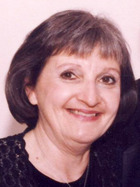
Elise, age 61, is a caregiver to her husband Phil, who was diagnosed with acute myeloid leukemia (AML) in November of 2009. Phil had been seeing a hematologist for an unrelated blood condition when lab test results indicated he had abnormal myeloid blasts in his blood.
“Neither of us knew what ‘blast’ meant,” recalls Elise. Doctors ordered a bone marrow biopsy, and the results showed Phil had AML. “When I heard the word ‘leukemia,’ it was just devastating. It changed our lives completely.”
Phil needed treatment immediately—there was no time for a second opinion—but he also needed to undergo several procedures, including dental work and a platelet transfusion, before he could even begin chemotherapy. “It was an exhausting week,” says Elise. “This was all very new to us. We were running around, basically just following instructions.”
Elise remembers realizing early on the importance of educating herself about her husband’s condition. “I dialed every phone number with the word ‘leukemia’ in it. It was a whirlwind of self-education from every cancer organization.”
She also recalls not driving for a while but realizing she had to face her fears if she was going to care for her husband. “I was very apprehensive about driving, but I said to myself, ‘Elise, you gotta get behind that wheel!’ If anyone would have told me last year that I’d be doing what I was doing, I would’ve told them they were crazy.”
Phil’s induction chemotherapy lasted 27 days and was administered at a local hospital. In April of 2010, after a suitable donor was found, Phil also went on to have a bone marrow transplant (BMT). For this treatment, however, the couple had to travel to a center in Tampa, more than 250 miles from their hometown.
Phil had four days of intense chemotherapy to wipe out his immune system followed by the BMT. Regarding the procedure itself, Elise says, “Watching the transfusion was uneventful. It’s probably the simplest process of the whole ordeal.” What happened in the days after the transfusion was another story.
Phil experienced many debilitating side effects from his treatment, among them oral mucositis, which made eating and swallowing excruciatingly painful, cataracts, and osteoporosis. Phil had to have surgery for the cataracts, and he was treated for osteoporosis but developed a negative reaction to the drug he was taking.
“Both my parents went through open heart surgery, and I thought I had seen every horrific site one could see, but I have never seen anything like what my husband went through during his recovery.”
In total, the couple spent 110 days away from their home for this phase of Phil’s treatment.
Today, Phil is doing better. He is leukemia-free but still recovering. “The fatigue is still there, the lack of energy, the daily ups and downs,’” says Elise. Recently, he also developed pneumonia and had to be hospitalized again. Reflecting on everything they’ve been though, Elise says, “It’s been a real roller coaster ride. I’ve never been a fan of roller coasters, but this is the worst.”
Fortunately, Elise has found support from many corners throughout Phil’s diagnosis and treatment. The couple was matched with an AML survivor, and was able to befriend other couples going through the same process. In addition, they received assistance from a social worker at an organization that provides information and support for BMT patients.
They also received help from CancerCare. Elise first contacted us in December of 2009 for financial assistance for transportation, as well as for emotional support for her needs as a caregiver. She joined a telephone support group for caregivers led by oncology social worker Chrissy Rubin, which started in February of 2010.
When the group ended, Elise continued to work with Chrissy through individual phone counseling to help her get through the next phase of her husband’s care. She is very grateful to Chrissy for all the support and encouragement she has provided.
“Chrissy and I developed quite a rapport over the past year. She’s been a great support system. I can tell her how I’m feeling and what’s going through my mind. Every Friday, she calls me at 11:30, and I look forward to her calls. I get a lot off my chest. I would love to one day meet her and thank her for being there this year.”
Elise shares how Chrissy once sent her a poster of the famous World War II icon Rosie the Riveter. “She said I reminded her of Rosie.” The image of Rosie paired with the words “We Can Do It!” captures the tremendous strength and resilience Elise has exhibited in her role as caregiver.
But Elise also sees another comparison: “We’ve been through a war. We’ve been through combat.” And both she and Phil have found writing about these experiences to be very cathartic. Phil keeps a journal that now totals more than 200 pages, and Elise has written poetry throughout the process, capturing the emotions she went through at the various points in her husband’s journey.
Her latest poem puts into words the immense gratitude she feels towards the young man who donated the stem cells for Phil’s BMT. The couple recently had the chance to learn his name and reach out to him to thank him personally. Says Elise: “The emotions that went along with that were overwhelming. How do you thank somebody for saving your husband’s life?”
